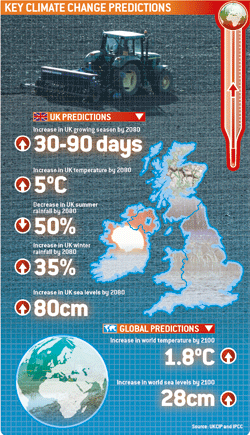The forecast is for climate change

Cedric Porter puts the challenge of change into context
Anyone doubting that the climate is changing the way Britain is farmed only needs to look at the government’s own figures. They show that:
- 2006 was the hottest year ever recorded
- The temperature in central England has increased by 1°C since 1970
- The growing season has extended by a month in central England since 1900
- The number of air frosts a year has plunged by 20 since 1961.
But, while warmer temperatures might extend the growing season, farmers need to prepare for both too much and too little water. In the past 100 years rainfall levels have fallen by 2%, but leapt by 7% since 1961. Farmers in Scotland have coped with a 23% increase in rainfall in the past 50 years, while even the breadbasket of East Anglia has seen nearly 10% more rain.
With climate change appearing to accelerate, producers can expect as many as 50 more growing days a year in the next 70 years. Meanwhile, temperatures could increase by 1.5°C within the next 12 years and be up by 5°C by 2080.

After the wet harvest it is difficult to believe that summer rainfall is predicted to slip 10% by 2020 and slump by a half by 2080. And while winters might be warmer, they are set to get wetter. Winter rainfall could be 35% higher by 2080.
Globally, temperatures have risen by 0.74°C since 1906, with 11 of the 12 warmest years since 1850 occurring between 1995 and 2006.World sea levels are also up 15cm over the same period. It is predicted that global temperature will rise between 1.8°C and 4°C by the end of this century with sea levels up a further 28cm to 43cm.
These global changes are likely to affect less fortunate farming regions more severely than the UK. Australia is already suffering and the prospects for Mediterranean farmers are not bright. Britain’s temperate climate means that it has an important role to play in supplying food and developing technology that will reduce the effects of climate change.
The UK is already committed to reducing carbon dioxide emissions by 60% by 2050. As farming accounts for 7.5% of UK emissions, British farmers will be called on to reduce their carbon bootprints, particularly as the UK government wants to be seen to be taking a global lead in tackling climate change.
But climate change should not just be viewed as a challenge. It also provides farmers with opportunities and the motivation to farm more efficiently and profitably. In these pages we discuss the major climate change issues facing farmers and meet producers who are already adapting their businesses to make sure they are still farming, whatever the climate may be.
